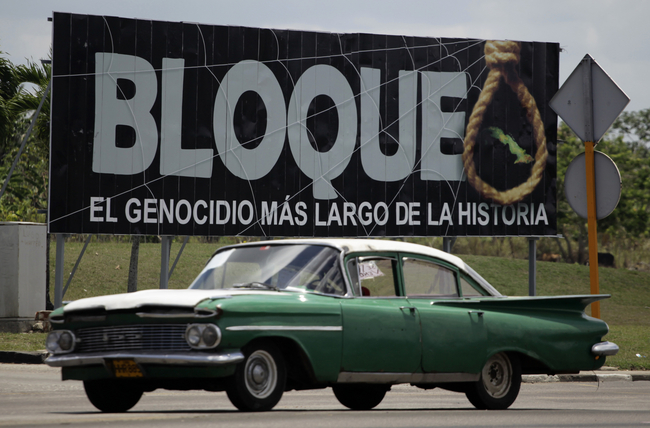Why a blockade and not an embargo?
Cuba–USA: Nacionalizaciones y Bloqueo | Friday, 3 February 2017 | Click here for original article

Although the United States didn’t fully implement the blockade against Cuba until February 7, 1962, it had been applying similar policies against the island since 1959
The measures adopted against Cuba by the United States government do not fall within the category of "embargo." On the contrary, they go beyond this definition to represent a "blockade," on seeking to persecute, isolate, suffocate and immobilise Cuba, with the aim of suffocating its people and forcing them to renounce their decision to be sovereign and independent. These are all fundamental elements of the concept of a "blockade," which means to cut or close off a nation to the outside world, in order to isolate and oblige the besieged country to surrender by force or starvation.
Blockades have been recognised as an "act of war" in international law since the London Naval Conference of 1909. In accordance with this principle, such a measure can only be exerted between warring factions. On the other hand, there exists no international law justifying a so-called "peaceful blockade," as was commonly used by colonial powers during the 19th and early 20th century.
Nor does such a controversial concept have a tradition in international law as accepted by the United States of America, but U.S. authorities have a bad memory and forget that in 1916, they warned France that "The United States does not recognise the right of any foreign power to impose barriers to the exercise to the commercial rights of non-interested nations, by using the blockade when there is no state of war."
"Embargo" is generally understood to be a legal method of retaining goods to ensure the fulfilment of a legitimately contracted obligation. It can also be a preventive measure of a patrimonial nature authorised by a judge, court or competent authority with the same purpose of obliging the debtor to fulfil commitments to creditors. Is Cuba indebted to the United States? Has Cuba committed any such crime that would justify the seizure and liquidation of its assets by the United States? The answer is clear and conclusive: No.
Cuba hasn't been, nor is it, a threat to the security of the United States, thus the attempts to apply measures in the name of legitimate self-defence with regard to the island stand in violation of international law, given that such regulations do not recognise the concept of subjective legitimate self-defence, nor the claim of legitimate defence as advocated by the Monroe Doctrine, which is in fact a policy of aggression.
Despite their use of the term "embargo", this group of coercive and aggressive economic measures is in fact an illegal blockade imposed by the United States against Cuba. This criminal behaviour against the island can not be concealed, nor can action be taken against the island based on legal concepts that do not exist. The U.S. government uses the concept of an "embargo" to conceal its application of wartime measures against the island, of an undeclared war against the Cuban people. The blockade against Cuba is the utmost expression of genocidal conduct by the United States, aimed at intentionally subjecting Cubans to extremely hard living conditions, which could potentially cause total or partial physical damage in order to weaken their resolve to fight and overcome.
Although the United States didn’t fully implement the blockade against Cuba until February 7, 1962, it had been applying similar policies against the island since 1959. For example the island's sugar quota was cancelled, the most important sector for Cuba's economy and finances; while U.S. oil companies, which controlled energy production and distribution in the country, decided to suspend supplies and refused to refine oil, in order to weaken key points of Cuba's defence and economy, and paralyse the country; something which they did not achieve. Meanwhile, an underhanded boycott of any purchase of spare parts manufactured in the United States for Cuban industry was added to the aforementioned list of measures, again with the same futile purpose.
However, when the U.S. government realised that a partial blockade wasn’t enough to defeat the Cuban people, a total blockade against the island was declared by then U.S. President John F. Kennedy, beginning at midnight on February 7, 1962, complying with the order from the U.S. Congress established under Section 620a of the Foreign Aid Act of September, 1961.
The obvious intentions of the blockade stand in contradiction to the human rights of the Cuban people and their freedom to exercise their right to self-determination, a right enshrined in the United Nations Charter, the Declaration on Human Rights and in Article 1 of the International Treaty on Economic, Social and Cultural Rights and the Treaty on Civil and Political Rights. Who is then violating the rights of the Cuban people?
Such acts of aggression have been repeatedly condemned in numerous UN resolutions. For example, Resolution 2625 of October 24, 1970, approved during the 25th Session of the United Nations General Assembly, where the sovereign equality of states, peoples’ right to self-determination and the obligation of all nations not to interfere in the internal affairs of other states, were established.
Resolution 2625 also asserts that "No State may use or encourage the use of economic political or any other type of measures to coerce another State in order to obtain from it the subordination of the exercise of its sovereign rights and to secure from it advantages of any kind… Every State has an inalienable right to choose its political, economic, social and cultural systems, without interference in any form by another State."
Excerpts from the book Cuba–USA: Nacionalizaciones y Bloqueo by Dr. Olga Miranda Bravo, Editorial de Ciencias Sociales, Havana, 1996. Source: http://www.cubavsbloqueo.cu






